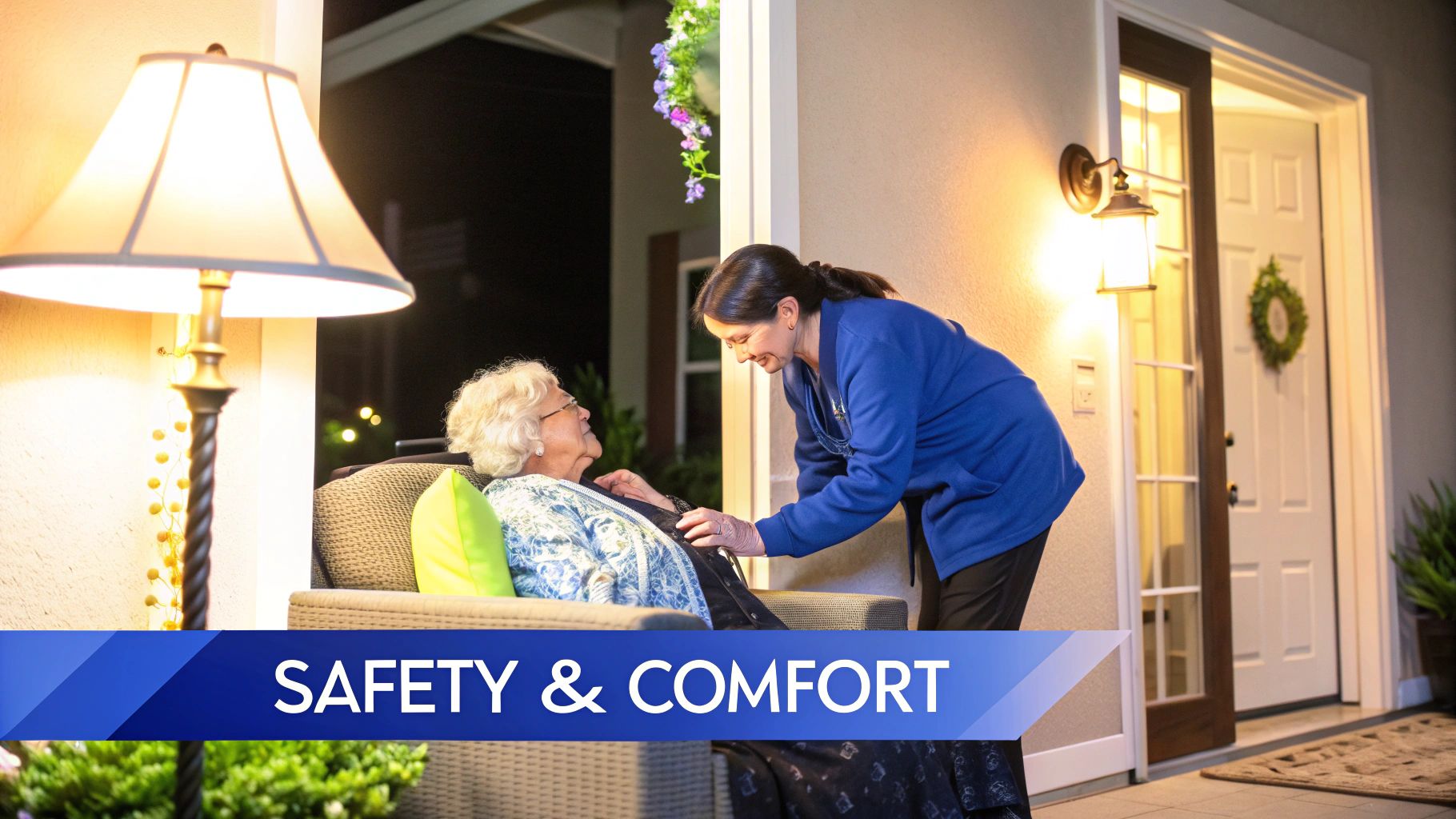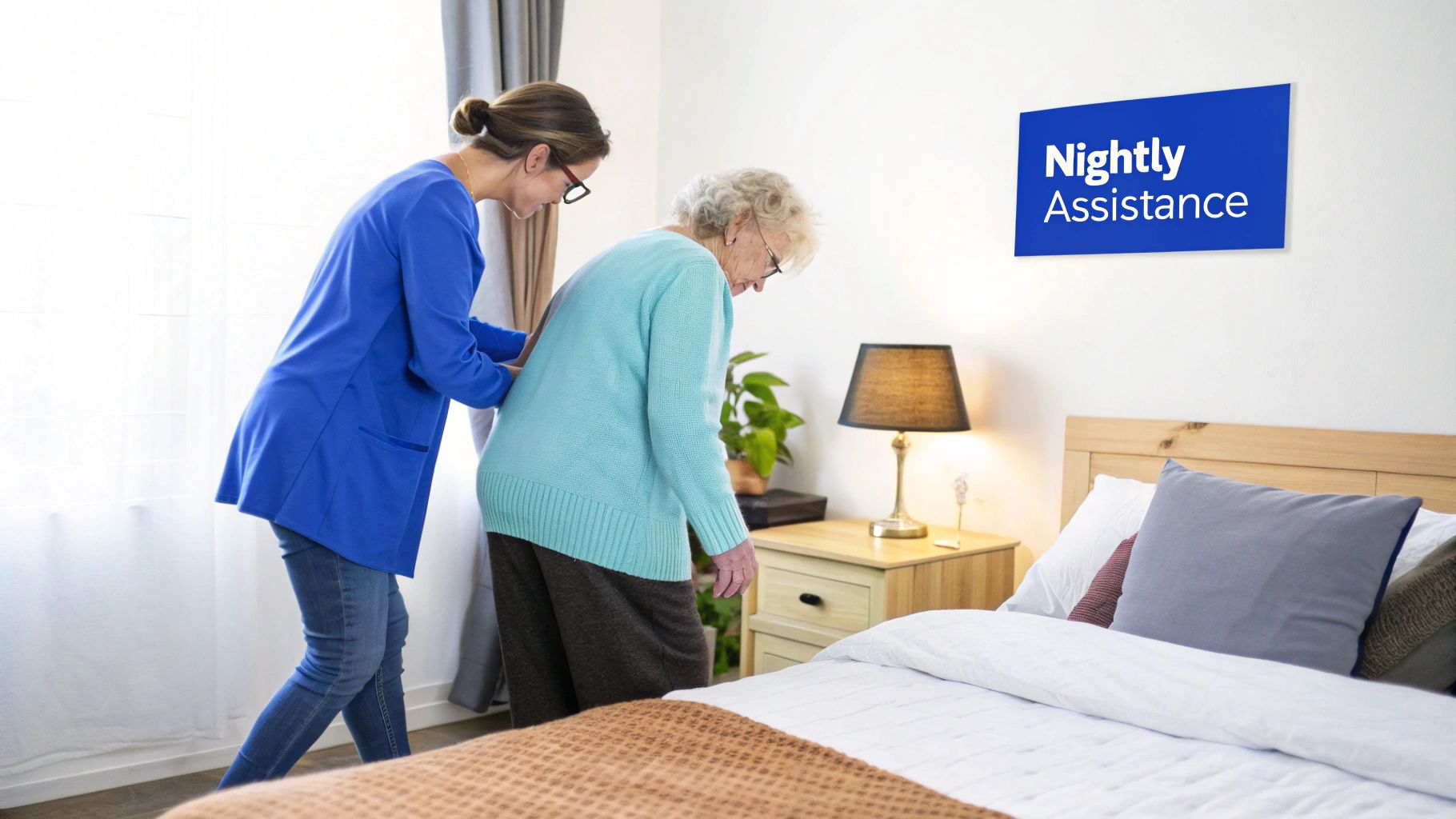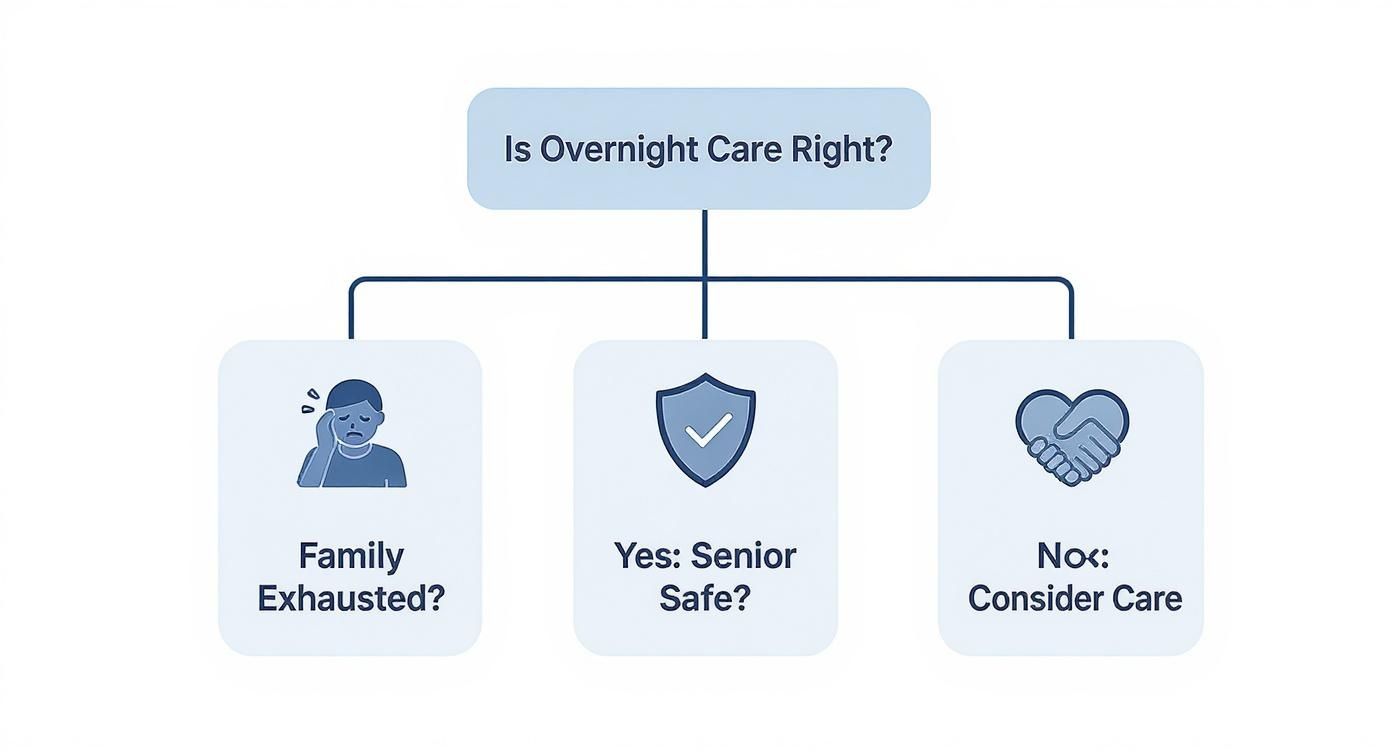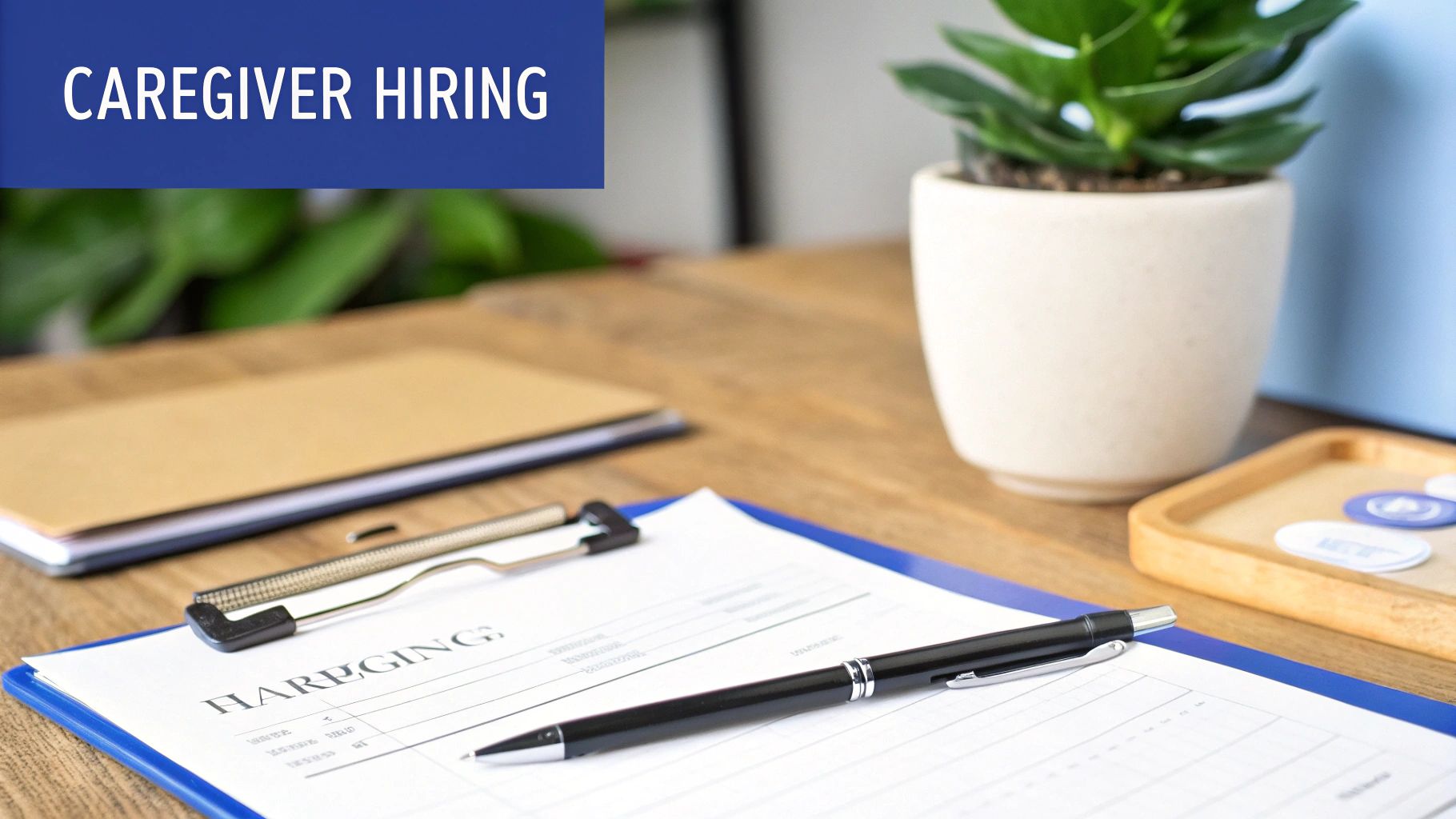When you hear the term overnight caregiver for the elderly, what comes to mind? For many families, it's the idea of a dedicated night watch—a professional who ensures a loved one is safe, comfortable, and supported while everyone else gets some much-needed rest.
Understanding the Role of an Overnight Caregiver

As our loved ones get older, the nighttime hours can become a source of genuine risk and anxiety. Simple worries about falls, a loved one with dementia wandering off, or a medical issue cropping up can easily keep family caregivers tossing and turning all night.
This is exactly where an overnight caregiver steps in, creating a vital bridge between a senior’s desire for independence and the family’s need for safety. Their main job is to provide peace of mind simply by being present, alert, and ready to help at a moment's notice.
The growing need for this kind of specialized support isn't just anecdotal. The global market for respite care, which includes these essential overnight services, is expected to jump from USD 352.9 million in 2025 to more than USD 527.1 million by 2032. This trend really underscores how critical these caregivers are to a family’s overall well-being. You can dig into the full research on this growing market over at coherentmarketinsights.com.
Two Core Models of Nighttime Support
Overnight care isn't a one-size-fits-all service. It’s always adapted to what your loved one actually needs. Generally, these services fall into two main categories, each built for a different level of support.
-
Awake Overnight Care: Just like it sounds, the caregiver is awake, alert, and on duty for the entire shift. This is the best fit for seniors who need frequent, hands-on help—someone who may wander due to dementia, needs to be repositioned regularly to prevent bedsores, or requires medication at specific times throughout the night.
-
Asleep Overnight Care: In this setup, the caregiver is on-site and can sleep but is ready to jump up and assist if an emergency happens or your loved one calls for them. This is a great option for seniors who are fairly independent but might need a little help with bathroom trips or just feel safer knowing someone is there.
To make it easier to see the difference, here's a quick comparison of the two models.
Comparing Awake vs Asleep Overnight Care
This table breaks down the two primary models of overnight caregiving, helping you quickly see which service might be the right fit for your loved one's needs.
| Feature | Awake Overnight Care | Asleep Overnight Care |
|---|---|---|
| Caregiver Status | Remains awake and alert throughout the entire shift. | Sleeps in a separate area but is available to assist as needed. |
| Ideal For Seniors Who… | Require frequent assistance, have high fall risk, wander, or need regular medical monitoring or repositioning. | Are mostly independent, need minimal help, or feel anxious being alone at night. |
| Level of Interaction | Proactive and continuous. The caregiver is actively monitoring and assisting. | Reactive. The caregiver responds to specific calls for help or emergencies. |
| Common Tasks | Toileting assistance, medication reminders, repositioning, managing dementia-related behaviors, providing comfort. | Responding to occasional wake-ups, providing reassurance, assisting with bathroom trips, emergency help. |
| Cost Structure | Typically charged at a higher hourly rate due to the active nature of the work. | Often charged at a lower flat rate for the entire shift. |
Seeing the options laid out like this can really clarify what kind of support would bring the most comfort and security to your home.
An overnight caregiver provides far more than just physical help. They offer a calming presence that can dramatically cut down on nighttime anxiety and confusion, creating a more restful environment for everyone.
Figuring out these differences is the first real step in building the right support system for your family. While both roles offer a safety net, what they do day-to-day (or rather, night-to-night) is quite different. The services often share common ground with other types of in-home support, and you can learn more about companion care in our detailed guide.
What an Overnight Caregiver Actually Does

It’s one thing to talk about the idea of overnight care, but what does it actually look like from one night to the next? It’s so much more than just having someone sit in a chair and watch over your loved one. An overnight caregiver is an active guardian, protecting their health, safety, and comfort when they’re most vulnerable.
Every senior’s needs are different, so the caregiver’s duties are tailored specifically to them. This hands-on support is what truly transforms an anxious, restless night into a period of genuine rest—and what gives families real peace of mind.
Promoting Safety and Comfort All Night
The number one job of an overnight caregiver is to prevent accidents and manage any needs that pop up after dark. This involves a whole range of supportive tasks that keep a senior safe and comfortable right up until the sun rises.
Some of the most common responsibilities include:
- Mobility and Toileting Assistance: A trip to the bathroom is one of the most common reasons for a fall during the night. A caregiver is right there to offer a steady arm, helping your loved one get out of bed, walk to the restroom, and get back safely.
- Incontinence Care: For seniors managing incontinence, a caregiver provides discreet and dignified help. They can assist with cleanup and changing bedding or clothing, making sure your loved one stays clean, dry, and comfortable.
- Repositioning in Bed: Lying in one position for too long can be incredibly painful and even lead to dangerous pressure sores, especially for those with limited mobility. A caregiver gently helps them turn and reposition every few hours—a small action that makes a huge difference for skin health and overall comfort.
These tasks directly tackle the biggest physical risks seniors face at night, turning what could be a hazardous time into a secure one.
Managing Health and Emotional Well-being
Beyond just physical safety, an overnight caregiver is also there to manage health needs and provide crucial emotional reassurance. The silence of the night can make feelings of anxiety or confusion much worse, particularly for seniors with dementia or Alzheimer's.
A caregiver’s calm and reassuring presence can be incredibly powerful for a senior experiencing sundowning or nighttime agitation. They offer gentle redirection and companionship, helping to soothe fears and create a peaceful atmosphere.
They also provide essential health support, like giving scheduled nighttime medications or just being there with a glass of water. A huge part of the role is also helping your loved one get back to sleep, often by using effective insomnia tips for seniors. By managing all these details, they ensure a senior’s health is looked after around the clock, which leads to better stability and well-being. This proactive care truly makes a profound difference.
The True Benefits of Overnight Senior Care
Thinking about bringing in an overnight caregiver for the elderly can feel like a huge step. But the positive effects go far beyond just keeping a loved one safe—they ripple through the entire family. For a senior, it often means a profound shift in their quality of life. It’s the difference between a night filled with anxiety and one of genuine, peaceful rest.
With a professional caregiver on hand, the risk of a fall during a late-night trip to the bathroom drops dramatically. This isn't just about physical safety; it's about deep emotional comfort. Seniors can sleep more soundly knowing a calm, capable person is right there to help with medication, a glass of water, or simply offer a reassuring word during a moment of confusion.
Perhaps the most important benefit is one you can't quite measure: the preservation of dignity. Overnight care lets seniors stay in the home they love, surrounded by familiar things, without forcing family members to sacrifice their own health in the process.
Easing the Burden on Family Caregivers
For family members, the relief is just as powerful. Being a family caregiver is a 24/7 job, and the nighttime hours are often the most draining. So many people lie awake, listening for any little sound, their minds racing with "what if" scenarios. This constant state of high alert is a direct path to exhaustion and burnout.
Hiring a professional gives you an incredible gift: permission to rest. When you know a trained caregiver is on watch, you can finally get deep, restorative sleep. This isn't a luxury; it's essential for maintaining your own health, your patience, and your ability to be a loving presence during the day. It helps you switch from being an exhausted, anxious monitor back to being a well-rested son, daughter, or spouse.
This kind of relief is critical, as the demands on family caregivers are massive. In the US, around 63 million Americans act as caregivers, with many handling complex medical tasks without any formal training. That immense pressure takes a toll, making professional respite not just a nice-to-have but a necessity for family stability. You can explore more about the rising demands on family caregivers at AARP.org.
The story of the Miller family shows this perfectly. For months, Sarah Miller was getting up several times a night to help her father, who had dementia. She was exhausted, irritable, and her own health was starting to slide. After they brought in an overnight caregiver, the change was almost immediate.
Her father was calmer through the night, and for the first time in a long time, Sarah slept peacefully. "I didn't realize how much the constant worry was weighing me down," she told us. "Getting that rest back didn't just help me—it made me a better, more patient daughter during the day."
How to Know When You Need Overnight Care
Making the call to bring in an overnight caregiver for the elderly can feel like a huge step. But in my experience, it's almost always a proactive move toward making life safer and calmer for everyone involved. The need for this kind of support rarely pops up overnight; instead, it tends to creep in through a pattern of small but telling signs. Learning to spot these signals early on can help you avoid a crisis and keep your loved one right where they want to be—safely at home.
The most straightforward indicators are usually physical. A recent fall is a major red flag, but even a few close calls or near-misses can turn nighttime into a period of high anxiety. If your loved one is already a bit unsteady on their feet, a simple trip to the bathroom after dark can become a serious hazard.
This decision tree can help you map out whether it’s time to start thinking about overnight help.

As you can see, the process often starts with how the family is coping before shifting to the senior’s immediate safety needs.
Key Warning Signs in Seniors
Beyond the obvious risk of falls, there are other changes in health and behavior that signal a need for nighttime supervision. It’s crucial to pay attention to these subtle shifts, as they often paint a much clearer picture of what’s really going on.
Here are some of the most common signs that an overnight caregiver might be necessary:
- Frequent Nighttime Waking: Is your loved one getting up multiple times a night? This doesn't just ruin their sleep; every time they get out of bed, it increases the chance of an accident.
- Growing Confusion After Sunset: Many seniors with dementia experience "sundowning," a state where confusion and agitation get worse as the day ends. A caregiver can be a calming, reassuring presence during these tough hours.
- Post-Hospitalization Recovery: The first few nights back home after a hospital stay are absolutely critical. An overnight caregiver can help manage the recovery process and prevent complications that could lead to a readmission.
- Wandering Tendencies: If your parent or loved one has a history of wandering, nighttime is a major safety risk. This is a situation that truly requires constant, alert supervision.
Don't Forget the Family Caregiver
The need for professional help isn't just about the senior's well-being—it's also about yours. If you're the one losing sleep, either from worry or from being woken up to help, you are on a fast track to complete burnout.
Chronic sleep deprivation doesn't just make you tired; it clouds your judgment, shortens your patience, and can do real damage to your own health. Recognizing that you're exhausted isn't a sign of failure—it's a sign that it's time to build a stronger support system.
When you can't get the restorative rest you need, you simply can't be the patient, effective caregiver your loved one deserves. Bringing in a professional is an act of care for both of you.
Understanding the Costs of Overnight Care
Let's talk about the financial side of overnight care. For most families, this is one of the biggest hurdles, but getting a clear picture of the investment involved can make the whole process feel much more manageable. The cost isn't just one flat number; it’s shaped by a few key things.
The biggest variable is usually the type of shift your loved one needs. Awake overnight care, where the caregiver is up and active all night, naturally costs more per hour than asleep overnight care, where they are on-site for emergencies but can rest. The level of care also plays a huge part. If a senior needs complex medical support, you'll need a caregiver with higher credentials, and that will be reflected in the price.
Key Factors That Influence Cost
Where you live matters, too. Just like the cost of living changes from town to town in New Jersey, so do the rates for an overnight caregiver for the elderly. A caregiver in a busy urban area will likely have a different rate than one in a quieter, more rural community.
It's also worth noting that a growing global demand for caregivers is impacting both availability and cost. We're seeing major demographic shifts creating a real shortage of qualified professionals. By 2060, it's estimated that 155 million Europeans will be 65 or older, and a huge number of them will need daily help. This will essentially double the current need for care. This isn't just a local trend; it's a worldwide one. You can read more about this growing challenge over at Deseret.com.
For a really detailed breakdown of what to expect here in our state, make sure you check out our guide on in-home caregiver costs in New Jersey.
How Families Typically Pay for Care
While the numbers can feel intimidating at first, families have several ways to fund this essential support. It’s pretty rare for one single source to cover everything, so most people piece together a financial plan using a combination of methods.
Planning for the cost of care isn't just about finding the money; it's about building a financial strategy that provides security for your loved one and peace of mind for your family.
So, how do most families handle it? It usually comes down to a mix of these common sources.
Here's a quick look at the most common funding avenues families explore.
Potential Funding Sources for Overnight Care
| Funding Source | Typical Coverage | Key Considerations |
|---|---|---|
| Private Funds | Covers all costs out-of-pocket, offering maximum flexibility. | The most direct method, using personal savings, investments, or retirement funds. |
| Long-Term Care Insurance | Can cover a significant portion of in-home care, but policies vary widely. | Check your specific policy for daily benefit amounts and elimination periods. |
| Veterans' Benefits | Programs like the Aid and Attendance pension can provide monthly funds for care. | Eligibility depends on service history, disability, and financial need. |
Many families find that blending these resources is the most sustainable way to ensure their loved one gets the consistent, quality care they deserve without placing an impossible burden on one person or account.
Your Step-by-Step Hiring Guide

Finding the right overnight caregiver for the elderly is easily one of the most important decisions you can make for your family. This isn't just about hiring help; it's about inviting a trusted professional into your home during its most vulnerable hours. To get this right, you need a clear, structured approach that puts safety, expertise, and simple human compatibility first.
The journey starts with really digging into your loved one’s specific needs. Go beyond the basics and create a detailed list of what the nights actually look like. Do they need a steady hand for late-night bathroom trips? Are they at risk of wandering because of dementia? Is medication needed at a very specific time? A well-defined care plan becomes your compass, guiding every decision from here on out.
Agency Professional vs. Independent Hire
With your plan ready, you'll hit a major fork in the road: do you hire through a professional home care agency or find an independent caregiver on your own? While hiring independently might look cheaper at first glance, going with an agency brings a layer of security and reliability that’s tough to match.
An agency takes care of the critical, non-negotiable groundwork for you. We're talking comprehensive background checks, verifying certifications, and handling all the payroll and liability insurance. This oversight is invaluable for keeping your loved one safe and protecting your family from legal headaches.
On top of that, a reputable agency acts as a crucial safety net. If your regular caregiver gets sick or has an emergency, the agency immediately sends a qualified replacement. This means you’re never left scrambling, and there are no gaps in care.
Key Questions for the Interview
Once you have a few candidates lined up, the interview is your chance to see beyond the resume. You aren't just checking off skills; you're looking for compassion, good judgment, and a communication style that works for your family. To find that perfect fit, you need to ask smart, scenario-based questions.
Here are a few essential questions to get the conversation rolling:
- Emergency Preparedness: "Can you walk me through what you would do if my mother fell during your shift?"
- Experience with Specific Conditions: "Have you cared for someone with sundowning before? How do you typically provide comfort and redirection?"
- Communication Style: "How would you keep us in the loop about how the night went?"
The answers will tell you a lot about a candidate's practical skills and, just as importantly, their ability to connect with your loved one on a personal level. A great starting point is often connecting with reputable CNA agencies that specialize in providing qualified professionals.
For a deeper look at the whole process, our complete guide on https://njcaregiving.com/hiring-a-caregiver/ has even more detailed advice to help you find the ideal match.
Of course. Here is the rewritten section, crafted to sound like it was written by an experienced human expert, following all the provided guidelines and examples.
Got Questions About Overnight Caregivers? We’ve Got Answers.
When you're thinking about bringing an overnight caregiver into your home, it’s only natural to have a few questions pop up. Getting these details sorted out is a key part of feeling comfortable and confident as you take this important step for your loved one.
One of the first things families ask is, "What happens if our caregiver has an emergency and can't make it?" This is where working with a professional agency really shines. Instead of you scrambling to find a last-minute replacement, a good agency immediately sends a qualified, fully-vetted caregiver from their team to fill in. That means no gaps in care and no panicked phone calls in the middle of the night.
Creating a Comfortable Space and Building a Connection
Another practical question is about the caregiver's own comfort. What do they need? For an "asleep" shift, where the caregiver is there for reassurance and can rest, you'll want to provide a comfortable spot like a spare bedroom or even a quiet couch. If you have an "awake" caregiver who needs to be alert all night, a comfortable chair is typically all that’s required.
But beyond the logistics, it's the human connection that truly matters.
Building trust from day one is everything. A reputable agency takes the guesswork out of this by handling all the critical background checks, verifying credentials, and speaking with references before a caregiver ever walks through your door.
We always encourage a "meet-and-greet" before the first shift officially starts. It’s a simple, low-pressure way for your loved one and the caregiver to get to know each other. Finding the right personality fit makes all the difference and helps ensure the entire experience gets off to a smooth, positive start.
At NJ Caregiving, we know that every family’s situation is a little different. Our goal is to provide compassionate, professional overnight care that gives your loved one the safety they need and your family the peace of mind you deserve. To learn more about our personalized care plans, visit us at https://njcaregiving.com.


